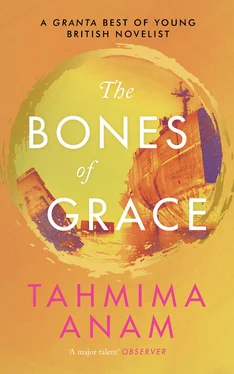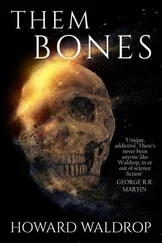Then I came to the story of Shahed, a young man we had interviewed together. I remembered the way you held his gaze because he had refused to look at me. He had been sent here only a few months before, and was living not at the dormitory but in a room he shared with a few other strays. Ali had taken him on as an apprentice, and he had yet to be paid. He ate, he said, by begging on the highway at night, and during the day, when the others saved him a few mouthfuls of rice. He had a cut on his arm that looked raw, which we only discovered when you put your hand out to touch him and he flinched, the thin fabric of his shirt sliding from his shoulder. You dressed the wound yourself, telling me later your father had taught you first aid in the days when you’d lived in the house in the mountains and there wasn’t a doctor around for miles. Now, reading Shahed’s words, and imagining in the pauses your fingers unrolling the bandage, splashing alcohol on the wound, and all the time Shahed not flinching, not making a sound, his lips parting as you finished, wanting to kiss the hand that touched him with as close to a caress as he had known since saying goodbye to his mother in the winter, she with a touch of her palm on the top of his head, you with a careful tap of the surgical tape.
I went upstairs to the apartment to face Gabriela. I assumed she had built up a catalogue of things to say; I had left without a word to her and ignored her many phone calls and messages, and, worse, I hadn’t even asked after Mo or any of the other men on the beach.
Inside, the place had been stripped of its last traces of you. Gabriela had cleaned everything up. The grey mosaic floor was spotless. All the dusty corners of the flat, the empty bookcase and the window grilles, had been washed. Even in my bedroom the blanket had been folded and the sides of the mosquito net pulled up so that it formed a flat grey canopy over the bed. As soon as she saw me Gabriela said, ‘Where the fuck have you been?’ and I braced myself, but she laughed and put her arms around me. I began to explain, starting with your name, but she said, ‘First, we drink. Then you can grovel.’ We repeated the ritual of my first night at the apartment, though this time the tequila went down easily, and after two big gulps from the bottle I didn’t even feel a little bit drunk.
I asked after Mo. Gabriela told me that he had continued with his duties, cooking and cleaning and looking after her. I had thought, for just a whisper of a moment, that wherever you had gone, you had perhaps taken him with you, but I knew this would be impossible. You would have wanted to leave right away, and Mo didn’t have a pair of shoes, much less a passport. You would have left him behind, though you would not have abandoned him as roughly as I had. And you would not have abandoned me at all.
‘The only thing is, he seems to have run into some trouble with Ali. I’m not sure exactly what — Ali always pretends he hasn’t the faintest clue what I’m saying when I try to talk to him.’
‘I’ve fucked everything up,’ I said, the alcohol finally hitting me.
Gabriela laughed. ‘I was married once too, you know.’
I had never asked her. She had taken the studs out of her top two piercings, and her shirt was loose and fell several inches below her hips. She looked more normal now, yet somehow diminished.
‘I should have taken better care of you,’ I said.
She waved her hand. ‘Don’t worry, darling,’ she said. ‘I could see you were preoccupied.’
‘He was — is — a childhood friend. A childhood sweetheart.’ This is how I had always described Rashid. A childhood connection. ‘So romantic,’ my cousins used to sigh. ‘So sweetly old-fashioned.’
‘I met Elijah at a Shostakovich concert. Out of the blue. Lightning and thunder and all that.’
Gabriela nodded. She pulled a packet of cigarettes out of her handbag, a foreign brand in a dark blue box. ‘I didn’t know you smoked,’ I said.
Gabriela inhaled. ‘I never needed to before.’
‘And what about you?’
She scraped a match against a rough wooden box. ‘We were children, we didn’t know what we were doing.’
‘I sort of feel like that. But that’s not an excuse. I mean — for me.’
She laughed. ‘He’s the director of the film. We’re still close friends.’
‘What happened?’
‘I cheated, he forgave me. I was the one who finally left. Now he’s married, he has three children. The terrible thing is, I’m probably still in love with him.’
Something in her face reminded me of Ammoo. Not that Ammoo herself regretted anything, but she was in constant fear that I would have regrets, that if I didn’t marry Rashid, for instance, that I might carry around the expression that could be seen on Gabriela’s face right now, the sense of having allowed a chance at happiness to pass me by. Ammoo wanted, more than anything, to mitigate disappointment for me. I wasn’t sure what to say to Gabriela, and what would it be like for me, ten, twenty years from now? Would I pine for Rashid, for the familiar rituals of our togetherness, being able to anticipate so many of his gestures — would I miss the safety of that or, as now, would I be tired of knowing so much, would I continue to long for otherness, for the pleasures of the alien?
The door opened, and Mo entered carrying a shopping bag. His smile when he saw me was so wide, so undiminished, that I stood up and walked over to him and lifted him up in my arms. He was heavier than he looked, and smelled of sweat and iron.
‘Did you hear about the piano?’ he said.
I hadn’t.
‘It’s going to America. Elijah is going to fix it.’ The sound of your name in Mo’s mouth was the first time I had heard it uttered aloud since you left, and it struck me with great force. Mo didn’t know the details, but he had heard Ali saying that the American who had been visiting had somehow arranged for the Steinway to be transported to Boston, where it would be restored, and then presumably sold on. I stood frozen as the tears gathered in my eyes, my ears still humming to the sound of your name, and beyond, to the notes you had played on Grace .
I wanted to hug Mo again but I didn’t. My arms were suddenly without feeling or energy. I asked after the others. ‘How is everyone?’ I asked him.
‘Russel is still looking for his brother,’ he said.
‘And Belal?’
Mo kept his eyes trained on his feet. ‘Belal has gone home.’
‘Why?’
‘Mr Ali said he was making trouble.’
‘Did he do something?’
Mo shrugged. ‘I can’t say.’
Again I was pierced with guilt for having abandoned them. I tried to remember if there was anything about Belal that stood out. He didn’t strike me as the type of person who would get under Ali’s skin. Ali had told me once that he would periodically encourage a turnover so that the workers would remember who was keeping their bellies full. I recalled it now, and the way Ali had said it, as if it was nothing to exchange one man’s labour for another’s. ‘You stay out of trouble,’ I said to Mo.
‘Mr Ali won’t leave me,’ he said. His belief that there was some security in his life made him seem all the more fragile. I was about to ask him why, whether there was some particular reason Ali would keep him around, but he disappeared into the kitchen, declaring he would make the best spinach curry I had ever tasted.
‘Did you practise the letters?’ I called out. ‘Every day!’ he replied, and in those words, in that voice, there was a small measure of consolation.
When I stood up to leave, I was suddenly dizzy, and I had to sit down again.
‘You sure you don’t want to sleep here?’ Gabriela asked.
‘I promised Rashid I’d stay in town.’
Читать дальше












